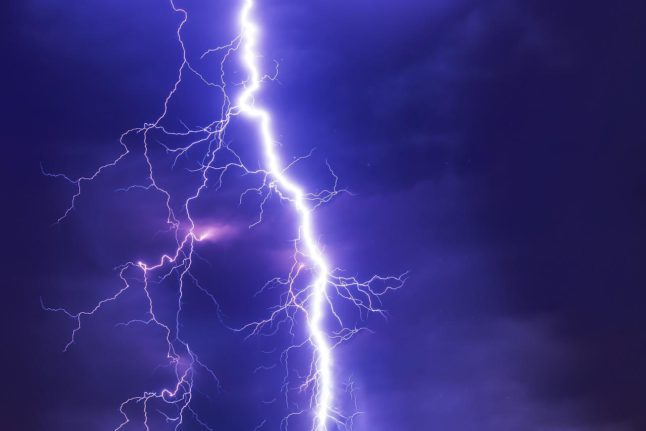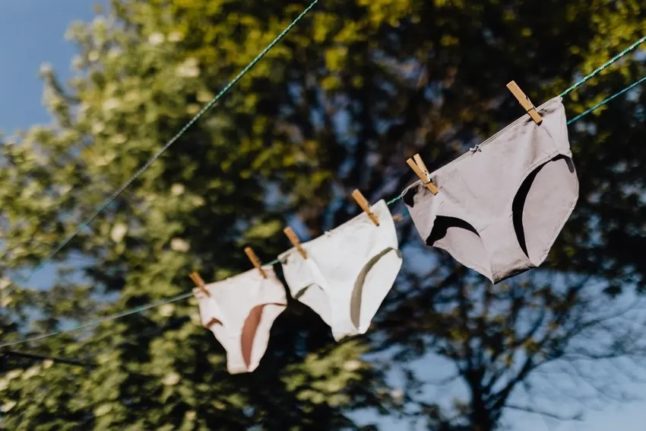Tens of thousands of lightning strikes hit Switzerland
The country was hit by more 20,000 strikes in past hours, according to MeteoNews weather service.
Swiss-German cantons were the most affected.
Storms, violent in some regions, contributed to a significant drop in temperatures.
Der "Pfuff" ist so ziemlich draussen! Bilanz: Über 22'000 #Blitze, #Regensummen bis über 30 Liter pro Quadratmeter, 10-Minutensummen bis über 15 Liter und #Böen bis im Flachland über 80 km/h. Mehr im Liveticker unter https://t.co/XGCha4qyvI. (rp) pic.twitter.com/c1bb79ARsg
— MeteoNews Schweiz (@MeteoNewsAG) May 23, 2022
However, weather should stabilise by mid-week, with very hot summer ahead.
READ MORE: Weather: Switzerland prepares for ‘record-breaking’ hot summer
New decisions concerning Covid boosters
The Federal Office of Public Health (FOPH) and the Federal Commission for Vaccinations (CFV) have issued new guidelines regarding second booster doses.
These shots are recommended for people “with a very weakened immune system”, FOPH said on Monday.
“There is no need for the general public to receive an additional booster vaccination in the current situation. According to available data, people who are fully vaccinated or vaccinated and cured are still well protected against severe forms of COVID-19”.
For those who need boosters for trips abroad, the government is “evaluating the possibilities” to administer the shots. This is all the more important as some countries still require proof of vaccination to enter and millions of Swiss certificates will expire by autumn at the latest.
Expanded guidelines for fourth doses for the fall will be issued within the next few weeks, FOPH said, adding that Switzerland has a sufficient number of vaccine doses.
READ MORE: What will Switzerland do about the ‘millions’ of expiring Covid certificates?
Switzerland is “on the move” – sort of
Did you know that Switzerland is moving slowly but steadily, along with neighbouring countries, about 2.5 centimetres every year towards Europe’s northeast part, according to the Federal Office of Topography (Swisstopo)?
Swisstopo’s specialists are measuring the country to the nearest millimetre to determine these movements.
The measurements are based on a network of 220 landmarks whose exact coordinates are known. They are then compared with the results of the measurements carried out every six years to see the shifts.
The exact position of fixed points is important for several reasons, including for the construction of infrastructure such as bridges, roads or pipelines.
Switzerland may not find itself near the Baltic sea in our lifetimes, but it’s good to know the country is not stagnant.
Weasels cause 40 million francs of damage each year
Many motorists in Switzerland know the experience of trying to start their cars in the morning and not being able to do so. That could be because weasels sneaked into the engine at night and chewed the cables. This happens most often, but not only, in the month of May.
“Each year, 17,000 weasel claims are declared to AXA Switzerland, which represents an amount of 8 million francs in total”, the insurer said in a press release.
Extrapolated to the whole country, the amounts likely reach 40 million per year, according to AXA.
The number of vehicles chewed up by weasels — also known as martens — has increased in recent years, especially in the cantons of Jura, Glarus, Thurgau and Schaffhausen, where the risk of suffering a weasel-related loss is, for inexplicable reasons, “up to 80 percent higher than the Swiss average”.
READ MORE: Why your Swiss car insurance should contain a ‘weasel clause’
If you have any questions about life in Switzerland, ideas for articles or news tips for The Local, please get in touch with us at [email protected]



 Please whitelist us to continue reading.
Please whitelist us to continue reading.
Member comments